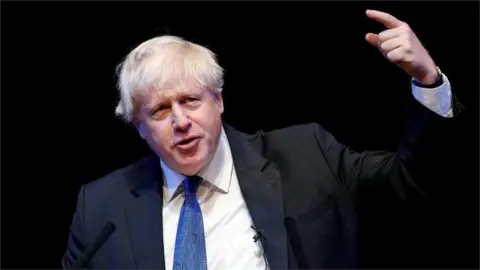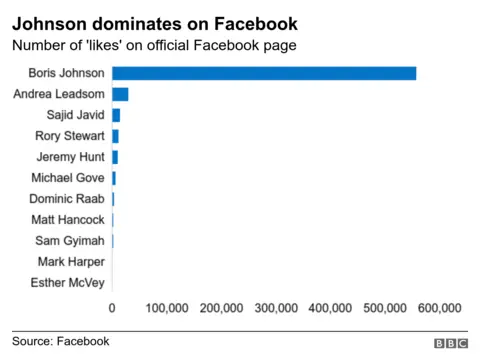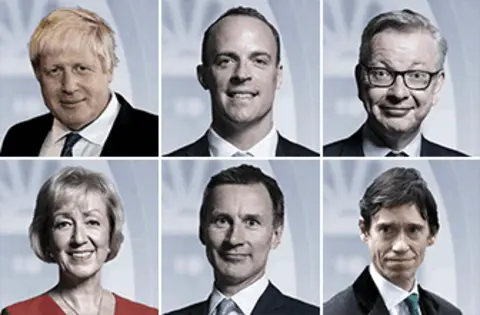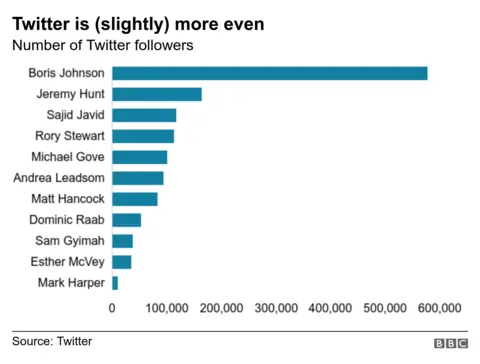Johnson dominates Tory social media race
 Reuters
ReutersThe battle is heating up in the race become the next Conservative leader - and one candidate has a built-in advantage.
Boris Johnson's social media reach dwarfs that of his rivals.
Far more people "like" his Facebook page and follow him on Twitter, though it remains to be seen whether he can convert that into votes.
MPs will narrow the field down to two this month, before party members elect a winner before the end of July.
Facebook likes
Facebook is by far the biggest social media site in the UK.
Around six in 10 Brits have used it in the past three months, according to polling firm Ipsos MORI - twice as many as used Instagram, which is owned by Facebook, and three times as many as used Twitter.
Mr Johnson's lead on Facebook is huge - more than half a million people like his page, which is far more than all of the other candidates combined.
Obviously not all of the people who "like" these pages will have a vote - the Conservative Party had just 124,000 members last year, when the figures were least released.
 Facebook
FacebookMr Johnson's page was set up in January 2008, a few months before he became Mayor of London.
He had a varied career as a columnist, magazine editor and TV panel show host, before being elected mayor of the Remain-leaning capital on two occasions, then campaigning for Brexit and becoming foreign secretary.
This means a lot of people who "liked" his page at some point in the last decade won't necessarily like him now, let alone be a Tory member with a vote.
But it does mean Johnson will find it easier to get his message out there - his launch video has more than 130,000 views on Facebook, substantially more than other candidates.

Who will replace Theresa May?

The winner of the contest to lead the Conservative Party will become the next prime minister.

Other candidates have a tiny fraction of Johnson's Facebook likes: Andrea Leadsom is second with 30,000, Sajid Javid third with 15,000, Rory Stewart fourth with 12,000, and Jeremy Hunt fifth with 10,000. (Esther McVey does not have an official page.)
Former Brexit Secretary Dominic Raab has been in the headlines constantly over the past year but his year-old Facebook page has just 4,000 likes.
All these figures above are just for the candidates' personal pages - Mr Raab has set up a specific campaign page as well, which has 1,600 likes.
Page likes are not everything - if people choose to share a post it will be seen by their friends, so a particularly compelling post by one of the candidates could be seen by a large pool of people - but a large base of likes certainly helps.
Another way of getting the attention of Facebook users is by paying to promote particular posts.
Mr Raab's campaign account has spent more than £17,000 on Facebook ads over the past two weeks, according to the website's ad archive.
Mr Javid and Mr Johnson have also spent small sums - under £300 - on Facebook ads.
Twitter followers
Far fewer people in the UK use Twitter, but it is disproportionately influential in Westminster.
The vast majority of MPs have an account, and political journalists spend their days glued to the site.
That means Twitter is important in the Conservative campaign, not just for getting a candidate's message out there, but also for influencing MPs, and persuading journalists of what is important.
Mr Johnson has far more Twitter followers than his rivals although the gulf is not quite as huge as it is on Facebook.
As above, these figures are only looking at candidates' personal accounts - there are several accounts for campaigns, like Back Boris or Team Saj.
 Twitter
TwitterHowever, following someone on Twitter does not necessarily imply approving of them as a person, in the way "liking" their Facebook page does.
Of course, there will be lots of people who "like" Mr Johnson on Facebook who do not actually like him, but this is even more likely to be true with Twitter followers.
One surprising breakout star on Twitter has been International Development Secretary Rory Stewart - more than two million people have seen his quirky videos over the past couple of weeks.
Mr Stewart's reach has been helped by shares from influential accounts like BBC Sport presenter Gary Lineker, and an interview with JOE.co.uk that has been seen 1.9 million times.
Allow X content?
Research suggests that UK Twitter users are more pro-Labour and pro-EU than the public at large, so the site might not be the best place to win over Conservative Party members.
Several candidates have Instagram accounts but this is unlikely to be a key factor in the race - unlike on Facebook and Twitter, Instagram posts do not generally reach many people who are not already following a page.
Older digital technology will also play a role - a key aim for every candidate will be to collect supporters' email addresses, and send regular messages asking for their vote and encouraging them to campaign.
Does any of this matter?
As well as being keener on a no-deal Brexit than the public at large, the Conservative Party membership is also richer, whiter and older - the average party member is 57 and four out of 10 are over 65.
As you would expect, older people are a lot less likely to use social media than the young.
Not many older Brits use Twitter or Instagram but a lot use Facebook according to Ipsos MORI..
A recent Newsnight investigation found closed Facebook groups were a target for fake news and polarising content ahead of last month's European Parliament elections - which could be a factor in this race.
Facebook may well have helped the Conservatives in 2015, Vote Leave in 2016 and Labour in 2017., but it is hard to measure definitively the influence of social media on any election.
Old media still matters and the biggest moments of this campaign will surely be the televised debates.
Every candidate will by trying to create a viral clip for social media, which party leaders already do at Prime Minister's Questions.
But when it comes to pushing out those clips to the public and Tory membership, one candidate has a huge built-in advantage: Boris Johnson.
